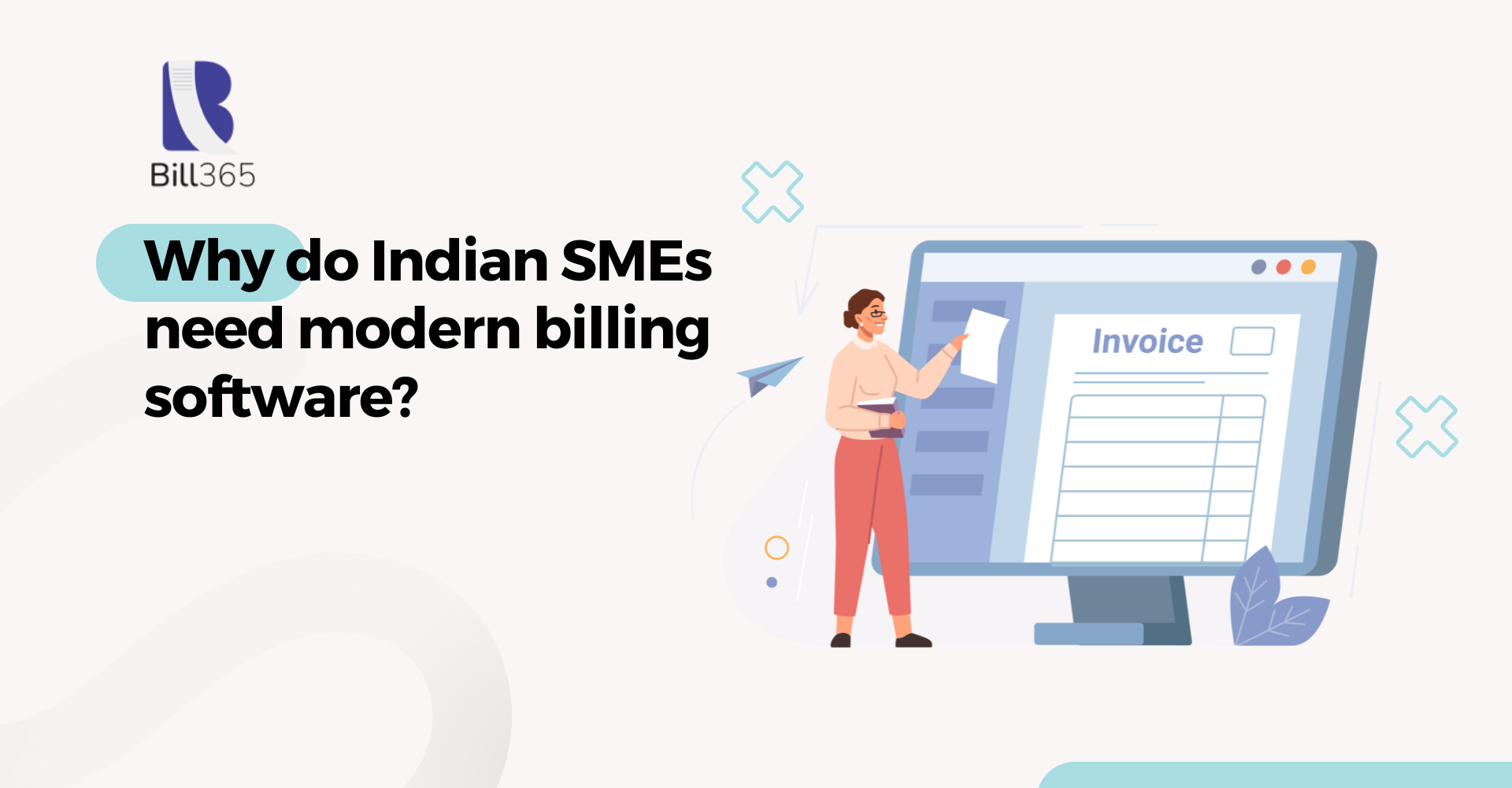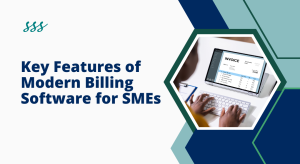
Why do Indian SMEs need modern billing software?
The backbone of India’s economy, small and medium enterprises (SMEs), faces numerous challenges in their day-to-day operations. One of the most significant hurdles is managing invoicing and financial records accurately. This is where billing software for SMEs becomes indispensable, offering streamlined solutions to modernize traditional business practices.
Indian SMEs often operate with limited resources, making efficiency and accuracy crucial to their success. Traditional billing methods, such as manual entries and paper invoices, are prone to errors, time-consuming, and difficult to maintain. With the rise of GST compliance requirements, SMEs are under pressure to ensure their billing processes meet government regulations.
Modern billing software addresses these challenges by automating invoicing, simplifying GST compliance, and providing real-time insights into financial operations. Beyond compliance, these tools improve efficiency, save time, and enhance customer experiences through faster, error-free billing. They are particularly beneficial for businesses looking to scale while maintaining control over their finances.
In a rapidly digitizing world, adopting billing software for SMEs is no longer optional; it is essential for survival and growth.
Challenges of Traditional Billing Methods
Traditional billing methods, though familiar, come with numerous challenges that hinder the growth and efficiency of SMEs. Manual processes, such as handwritten invoices and spreadsheets, are prone to human errors, leading to financial discrepancies and loss of credibility. These methods are time-consuming, often requiring extensive effort to track payments, reconcile accounts, and manage records. Moreover, maintaining compliance with GST and other tax regulations is a significant challenge, as traditional systems lack the features to automate tax calculations and generate GST-compliant invoices.
Another drawback is the lack of scalability. As businesses grow, managing increasing volumes of transactions becomes overwhelming with manual billing systems. Additionally, traditional methods do not provide real-time updates or integration with modern tools, leaving SMEs disadvantaged in a competitive market.
This is where billing software for SMEs proves invaluable. It eliminates manual errors, streamlines compliance, and offers efficient ways to handle billing and financial management. With increasing digitization and the government’s push for transparency, reliance on outdated methods is no longer sustainable. Adopting billing software for SMEs enables businesses to overcome these challenges, ensuring smoother operations, better accuracy, and enhanced customer satisfaction. Transitioning to modern solutions is the key to thriving in a dynamic market landscape.
Importance of Modern Billing Software for SMEs
By adopting modern billing solutions, SMEs can overcome traditional challenges, maintain compliance, and position themselves for sustainable growth. In today’s competitive market, leveraging advanced tools is not just an advantage but a necessity for long-term success.
1. Enhancing Efficiency and Accuracy
Modern billing software for SMEs automates the entire invoicing process, reducing the likelihood of human errors and ensuring accuracy in financial records. Manual billing often leads to discrepancies, missed payments, and time-consuming reconciliations. With automated tools, SMEs can quickly generate invoices, track real-time payments, and maintain organized financial records. This efficiency not only saves time but also allows businesses to allocate resources to other critical areas, boosting overall productivity.
2. Simplifying GST Compliance
Adhering to India’s GST regulations can be a daunting task for SMEs using traditional billing methods. Modern billing software for SMEs comes equipped with GST-compliant features, such as automated tax calculations, GST filing, and generation of compliant invoices. These tools ensure that SMEs stay updated with tax regulations and avoid penalties due to non-compliance. By streamlining the compliance process, billing software reduces the burden on business owners, enabling them to focus on growth and operations.
3. Scalability and Cost-Effectiveness
As SMEs grow, their billing needs become more complex. Modern billing software offers scalable solutions that adapt to the increasing demands of a growing business. These tools can handle larger transaction volumes, integrate with other business platforms, and provide insightful analytics for better decision-making. Additionally, billing software is a cost-effective solution, eliminating the need for extensive paperwork and reducing operational costs associated with manual processes. For SMEs, this ensures that as their business expands, their billing system remains efficient and reliable.
10 Key Features of Modern Billing Software for SMEs
Modern billing software for SMEs is more than a tool; it’s a strategic asset that empowers businesses to overcome challenges, enhance efficiency, and thrive in competitive markets. Adopting these solutions ensures that SMEs remain agile, compliant, and customer-centric in a rapidly evolving business landscape.

1. GST-Compliant Invoicing
Modern billing software for SMEs ensures seamless compliance with India’s GST regulations. It automates tax calculations, generates GST-compliant invoices, and prepares detailed tax reports. SMEs often face challenges in adhering to dynamic tax laws, but advanced software eliminates manual errors and reduces non-compliance risks. With features like automated GST filing and reconciliation, SMEs can focus on growth without worrying about tax penalties.
The software’s real-time tax updates keep businesses up to date, ensuring all invoices align with current regulations. Additionally, billing software for SMEs simplifies the filing process by integrating with government portals, making it an indispensable tool for businesses operating in India’s regulated tax environment.
2. Customizable Invoice Templates
One standout feature of modern billing software for SMEs is the ability to create customizable invoice templates. SMEs can design invoices that reflect their brand identity, including logos, color schemes, and personalized messages. A professional invoice not only strengthens brand recognition but also enhances customer trust. These templates cater to diverse business needs, allowing flexibility for unique formats and multilingual support.
By providing tailored invoice solutions, billing software for SMEs ensures that businesses deliver invoices that are both aesthetically pleasing and functionally effective. The ability to save and reuse templates further boosts efficiency, helping SMEs maintain consistency in their billing operations.
3. Automated Payment Reminders
Keeping track of payments is critical for SMEs, and modern billing software for SMEs simplifies this task with automated payment reminders. These reminders are sent to customers for upcoming or overdue payments, reducing the risk of delayed collections.
With customizable schedules, SMEs can maintain professionalism while ensuring timely payments. Automated reminders save time and minimize the manual effort involved in follow-ups. Additionally, some software integrates with payment gateways, making it easier for customers to pay directly through the invoice. By using billing software for SMEs, businesses can improve cash flow management and maintain strong relationships with clients.
4. Multi-User Access and Role Management
Modern billing software for SMEs supports multi-user access, allowing different team members to collaborate efficiently. Role-based access ensures data security by granting permissions based on individual responsibilities. For instance, a salesperson can generate invoices while an accountant can review financial reports, all within the same platform.
This feature enhances accountability and streamlines workflows, especially in growing businesses with multiple departments. By centralizing operations, billing software for SMEs eliminates the need for separate systems, reducing costs and improving operational transparency. Secure role management further ensures that sensitive data is protected while empowering teams to work collaboratively.
5. Cloud-Based Accessibility
One of the most valuable features of modern billing software for SMEs is cloud-based accessibility. With this feature, SMEs can access their billing system anytime, anywhere, using any internet-enabled device. This flexibility is particularly beneficial for businesses with remote teams or multiple locations. Cloud-based systems also ensure data security with automatic backups and encryption, reducing the risk of data loss.
Moreover, real-time updates allow business owners to monitor transactions and performance metrics on the go. For SMEs, cloud-enabled billing software for SMEs provides unmatched convenience, ensuring business continuity even in dynamic market conditions.
6. Integration with E-commerce Platforms
As e-commerce continues to thrive, modern billing software for SMEs offers seamless integration with popular e-commerce platforms. This feature enables businesses to synchronize sales data, automate order invoicing, and track inventory across multiple channels.
For SMEs, integration eliminates the need for manual data entry, reducing errors and saving time. It also provides consolidated insights into online and offline sales, empowering businesses to make informed decisions. By streamlining e-commerce operations, billing software for SMEs enhances efficiency and scalability, making it an essential tool for businesses looking to compete in the digital marketplace.
7. Real-Time Financial Insights
Understanding financial health is crucial for SMEs, and modern billing software for SMEs delivers real-time financial insights. With comprehensive dashboards and analytics, businesses can track revenue, expenses, and profit margins effortlessly.
These insights enable SMEs to identify trends, forecast cash flow, and make data-driven decisions. Additionally, real-time updates on pending invoices and overdue payments ensure better financial management. The ability to generate customized financial reports further helps in strategic planning. By offering a clear view of financial performance, billing software for SMEs empowers businesses to stay ahead in a competitive environment.
8. Inventory Management
Efficient inventory management is another key feature of modern billing software for SMEs. This functionality allows businesses to track stock levels, manage reorders, and avoid overstocking or stockouts. By integrating billing with inventory, SMEs can synchronize sales and purchase data, ensuring accurate inventory updates. Real-time inventory tracking helps businesses maintain optimal stock levels, reducing operational costs and improving customer satisfaction.
Advanced billing software for SMEs often includes alerts for low stock, enabling timely replenishments. For SMEs, this feature is a game-changer, streamlining supply chain management and enhancing overall operational efficiency.
9. Multi-Currency and Multi-Language Support
For SMEs catering to international markets, modern billing software for SMEs provides multi-currency and multi-language support. This feature simplifies transactions with global customers by generating invoices in their preferred currency and language. Automated currency conversion ensures accurate billing, while multilingual templates enhance communication with diverse clients.
By breaking language and currency barriers, billing software for SMEs facilitates global business expansion. This feature is particularly beneficial for exporters and businesses involved in cross-border trade, ensuring they maintain professionalism and accuracy in their billing processes.
10. Secure Data Management
security is a top priority for SMEs, and modern billing software for SMEs ensures robust protection of sensitive information. With features like encryption, role-based access, and regular backups, businesses can safeguard their financial data from breaches and loss.
Cloud-based billing software for SMEs offers additional security measures, including two-factor authentication and secure server infrastructure. This ensures that SMEs comply with data protection regulations while maintaining customer trust. By investing in secure billing solutions, SMEs can focus on growth without worrying about data vulnerabilities. Reliable data management also facilitates smoother audits and financial reporting, strengthening overall business operations.
Selecting the Right Billing Software
Choosing the best billing software for SMEs involves evaluating several key factors. Start by assessing your business needs, including invoicing volume, GST compliance requirements, and integration with existing systems. Look for software that is user-friendly and offers customizable templates to suit your brand. Security features such as encryption and regular backups are essential for protecting sensitive data.
Scalability is crucial to ensure the software adapts as your business grows. Ensure the vendor provides reliable customer support and regular updates to meet evolving market demands. By selecting the best billing software for SMEs, businesses can enhance efficiency, ensure compliance, and focus on growth without being bogged down by manual billing tasks.
Conclusion
Modern billing software is essential for Indian SMEs to streamline their operations, enhance efficiency, and maintain compliance with GST regulations. By automating invoicing, tracking payments, and generating insightful reports, businesses can save time and focus on growth. Adopting advanced billing solutions ensures accuracy and fosters trust with clients. For Indian SMEs aiming to stay competitive in today’s fast-paced market, embracing modern billing software is not just an option but a necessity.
